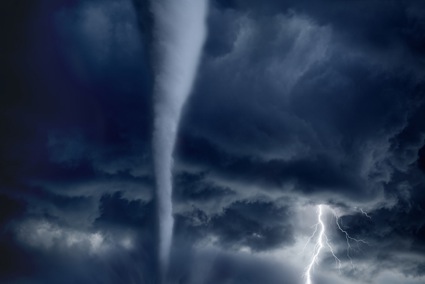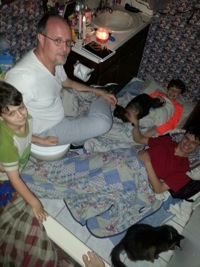Educating your kids about severe weather
When the alert for a tornado watch lit up my phone, my boys were immediately worried. “What does that mean, mama?” They asked. “Is a tornado coming?”
Severe weather can be very frightening for young kids, especially if they are unsure of what to do. Including your kids in preparing for a storm and talking to them about their fears can help them cope better. Here are some tips to help you educate your kids when severe weather threatens.
Explain the types of severe weather
Here in Georgia and Alabama we have three common types of severe weather, especially during the spring: thunderstorms, tornados, and flash floods. During late summer and early fall we will encounter tropical storms and possibly a hurricane. Explaining the differences to your children can help eliminate the fear of the unknown and create awareness.
Consider your child’s age, personality, and temperament when talking to them about storms. If your child is a worrier like my youngest, minimize information that might make them more anxious. If your child is curious like my oldest, include more factual information about storms, how tornados form, and what causes bad weather. Be sure to also explain the difference between a “Watch” and a “Warning.”
Tip: Explore educational websites together with your child. Ready.gov/kids has fun, educational games and activities for kids that you can use as teaching tools.
Teach your kids weather safety catch phrases
You probably remember the phrase “Stop, Drop & Roll” from childhood. Here are a couple more catch phrases you can teach your kids to help them easily remember weather safety:
- When thunder roars, stay indoors.
- Turn around, don’t drown.
- Ignoring a warning can cause much mourning.
- When you see lightning flash, get out of the pool fast.
- When hail rains down, there could be a tornado around.
Review your family emergency plan
Make sure your family has a plan in case of an emergency. Become familiar with your community’s Severe Weather Warning System and make certain every adult, teenager and child in your family knows what to do and where to go when a tornado watch or warning sounds.
If your children are older, sit down together and decide how you will get in contact with each other, where you will go and what you will do in an emergency. Review the plan with your children and practice it often, just as you would for a house fire.
Tip: Ready.gov has a Family Emergency Plan (FEP) that you can download and fill out.
Recruit your kids to help
Children can be great helpers. When a Severe Thunderstorm or Tornado Watch is issued, have them to help you gather the items you’ll need in an emergency. Giving them a job helps them feel in control, which reduces their anxiety. Make a scavenger hunt out of it and have them collect the following items:
- Favorite toy, stuffed animal, or book
- Bike helmet
- Backpack with a change of clothes
- toothbrush and toothpaste
- Raincoat or jacket
- Tennis shoes
- Blanket or sleeping bag
- Pillow
Manwhile, you can restock your diaper bag and charge up your cell phone. Put everything, including your Family Emergency/Disaster Kit in your home’s safe spot. If you live in a mobile home, put these items by the door so you can grab them and go. When a Tornado Warning is issued, your family will be ready if you need to take shelter.
Tip: Download FEMA’s Emergency Supply Kit Checklist for Parents
Items to Keep in Your Family Emergency/Disaster Kit:
- Non-perishable food items and bottled water
- A manual can opener
- First-aid kit
- Sun block
- A flashlight and extra batteries
- Safety Tattoos for young children (in case you get separated)
- Portable NOAA weather radio
- A wrench and other basic tools
- Work gloves
- A set of car and house keys and glasses
- A highway map that marks the counties to follow the storm
Items to Pack When a Watch is Issued:
- Blankets or sleeping bags
- One backpack per child (including a change of clothing)
- Prescription medications
- Feminine products
- Identification and a credit card or cash
- Important documents, including insurance policies
- Baby items, such as diapers, wipes and formula
Set a good example
Remember, you are your children’s best role model during severe weather emergencies. They will look to you for help and clues on how to act. Stay calm and take appropriate precautions. Explain what is going on, but keep it simple. While feelings of fear are natural, be in control of the situation as best you can. Your kids will watch and learn to do the same.
Tip: Most kids are resilient. But some children can be at risk for more enduring psychological distress. Ready.gov/kids has a list of FAQs to help your children cope during or after a disaster.




